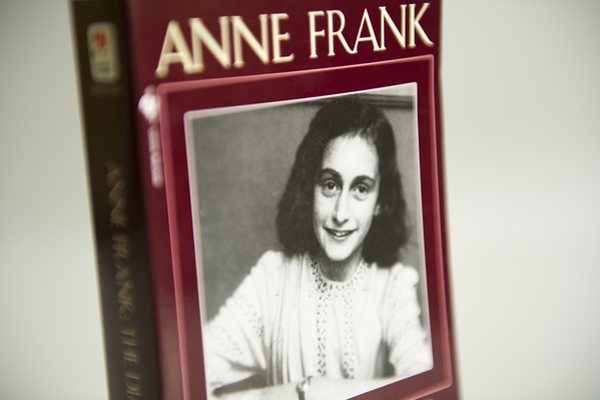3Qs: A ‘symbol of an unfulfilled promise’

From June 12, 1942, to Aug. 1, 1944, Anne Frank kept a diary of her family’s life in hiding in the secret annex of an Amsterdam warehouse. But on Aug. 4, 1944, Frank and her family were captured by the Nazi Gestapo and transported to a detention camp in Holland and then to Auschwitz in Poland. Frank was later transferred to Germany’s Bergen-Belsen concentration camp, where she died of typhus in March 1945. Her diary was published posthumously and eventually translated into more than 60 languages. We asked Lori Lefkovitz, Ruderman Professor and director of the Jewish Studies program, to expound upon the impact of Frank’s diary on the global understanding of the Holocaust.
What impact has Anne Frank’s diary had on the global understanding of the Holocaust?
The childhood reflections of Anne Frank, written in the Dutch attic where she hid with seven others from the Nazis from 1942 until 1944, have given the world one small entryway into the decimation of European Jewry. Anne’s edited and revised notebooks—which have sold more than 30 million copies, been translated into more than 60 languages, and been the basis for wildly popular dramas and literature—put the face, convictions, experiences, aspirations and tragic death of one articulate, loving girl to an incomprehensibly enormous story of human cruelty and historical catastrophe. In this record of daily life, 13-year-old Frank expressed the ordinary struggles and hopes of a person coming of age under extraordinary circumstances. A world of readers could relate to her unflagging belief in people and grieve her abrupt death.
The edited diaries, which Anne herself dreamed of one day publishing, inspired many people to learn more about the events of the World War II, and perhaps more important, to learn about the culture that was destroyed. When the world was ready to begin the still ongoing process of comprehending the events of the Shoah, her personal testimony was an invaluable early step. Now a classic text, the diary demonstrates the power of a single work and writer to reach into the hearts of people around the world and over the generations. Its impact has been tremendous.
How has Anne Frank’s legacy helped shape the cultural memory of the Holocaust for survivors and the cultural identity for modern Jewish culture?
Cultural memory refers to how a group, collectively, thinks about its own past and how that past provides a foundation for future identity. It refers to the legacy of history as it affects the living. The well-known photograph of Anne’s face inspires nostalgia for a generation of people whose lives were cut short and about whose contributions we can only fantasize. What novels and histories might Anne Frank have written had she been permitted to live into old age? What of the children and grandchildren she might have had? Anne is a symbol of promise unfulfilled. She is also an inspiration. To the very end, she professed her belief that people are good. Her legacy is part of a larger modern Jewish self-identity as a people who remembers the past and its ancestors with reverence, and is dedicated to honoring their memories by doing good works and by living Jewish lives true to the noblest values of Judaism’s ancient traditions.
Eleanor Roosevelt described Frank’s diary as “one of the wisest and most moving commentaries on war and its impact on human beings that I have ever read.” Why is this book, among so many others written about the Holocaust, so beloved?
This book is beloved because Anne Frank is lovable. She kept an honest record of intimate relationships and expressed her feelings sincerely and beautifully. The world has loved this book because it affirms the value of every life — of our own lives — not because we do great things but because we live in relationships and in communities. Roosevelt appreciated the power of the book to make us feel the impact of war, which wrenches people out of the routine efforts to live productively and, in the case of children, deprives them of the right to grow to adulthood.
Many works about the Holocaust are wise, moving and richly informative. This one stands out because, as a simple eloquent record of one person, it became a shared cultural artifact. Anne is part of the world’s childhood. We have her in common as someone we once knew, loved and lost. The universalizing of the diary has brought us closer to one another and invites us to mutual caring.






